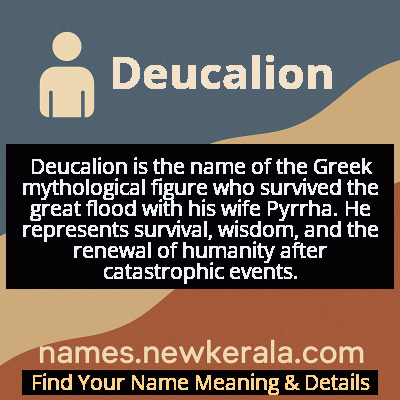Deucalion Name Meaning & Details
Origin, Popularity, Numerology Analysis & Name Meaning of Deucalion
Discover the origin, meaning, and cultural significance of the name DEUCALION. Delve into its historical roots and explore the lasting impact it has had on communities and traditions.
Name
Deucalion
Gender
Male
Origin
Greek
Lucky Number
3
Meaning of the Name - Deucalion
Deucalion is the name of the Greek mythological figure who survived the great flood with his wife Pyrrha. He represents survival, wisdom, and the renewal of humanity after catastrophic events.
Deucalion - Complete Numerology Analysis
Your Numerology Number
Based on Pythagorean Numerology System
Ruling Planet
Jupiter
Positive Nature
Optimistic, inspirational, and creative.
Negative Traits
Scattered, exaggerating.
Lucky Colours
Yellow, gold, purple.
Lucky Days
Thursday.
Lucky Stones
Yellow sapphire.
Harmony Numbers
1, 2, 9.
Best Suited Professions
Arts, writing, communication.
What People Like About You
Creativity, optimism.
Famous People Named Deucalion
Deucalion of Crete
Mythological King
Legendary ruler of Crete and father of Idomeneus
Deucalion (astronomical)
Mythological Namesake
Moon of Saturn discovered in 2000
Deucalion in Ovid's Metamorphoses
Literary Character
Central figure in the Greek flood narrative
Name Variations & International Equivalents
Click on blue names to explore their detailed meanings. Gray names with will be available soon.
Cultural & Historical Significance
Extended Personality Analysis
Those named Deucalion typically exhibit traits of wisdom, resilience, and strategic thinking, reflecting their mythological namesake's character. They are often perceived as natural leaders who maintain composure during crises, drawing on inner resources and learned knowledge to navigate challenges. The connection to Prometheus suggests intellectual curiosity and a tendency to question established norms while seeking practical solutions. Modern Deucalions often display strong protective instincts toward family and community, mirroring the mythological figure's role in preserving humanity. They tend to be forward-thinking individuals who plan carefully for the future while respecting traditions and ancestral wisdom. Their personality combines the practical survival skills of the ark-builder with the visionary qualities of a civilization-founder, making them both grounded and aspirational in their approach to life's challenges.
Modern Usage & Popularity
Deucalion remains an exceptionally rare given name in modern times, primarily used by parents with strong classical interests or those seeking distinctive mythological names. Its usage is most prominent in Greece and among academic or literary families who appreciate its rich mythological background. The name has never achieved mainstream popularity and doesn't appear in official name statistics of English-speaking countries. However, it occasionally surfaces in creative works, academic circles, and among families with Greek heritage. Recent trends toward unique mythological names have brought slight increases in recognition, though it remains far less common than other Greek mythological names. Modern bearers often value the name's connection to survival, wisdom, and new beginnings, seeing it as embodying resilience and intellectual heritage.
Symbolic & Spiritual Meanings
Deucalion symbolizes profound themes of destruction and rebirth, serving as the archetypal survivor who preserves civilization through catastrophic change. His story represents the cyclical nature of existence—the necessary destruction that precedes renewal and the human capacity to emerge wiser from adversity. The stones he and Pyrrha threw that transformed into new people symbolize the fundamental resilience of humanity and the idea that civilization can be rebuilt from basic principles. His ark represents preparation, foresight, and the preservation of essential knowledge through turbulent times. As the son of Prometheus, he also embodies the transmission of divine wisdom to humanity and the responsibility that comes with such knowledge. The flood narrative positions him as a bridge between the old world and the new, symbolizing hope, regeneration, and the enduring human spirit.

